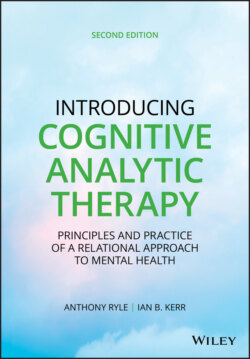Читать книгу Introducing Cognitive Analytic Therapy - Anthony Ryle - Страница 63
Evolutionarily Pre‐Programmed Psychological Tendencies
ОглавлениеMany authors (reviewed in Gilbert, 1992; McGuire & Troisi, 1998; Stevens & Price, 1996) suggest that pre‐programmed patterns, analogous to those triggered by the “innate releasing mechanisms” described by ethologists, may underlie our tendency to think and act in certain ways in certain circumstances. The Jungian concept of archetypes can be seen similarly. While requiring careful attention as partial, possible determinants of human behavior, we consider that to exaggerate their importance can be as reductive and misleading as some of the attempts by earlier socio‐biologists to explain culture in terms of the enactment of “hard‐wired” biological tendencies. However, according to these writers, there are highly stereotyped, ritual behaviors seen throughout the animal kingdom associated with, for example, aggression, status‐seeking, mating, or care‐eliciting and care‐giving. The power and apparent “irrationality” of such responses is well exemplified by the experience of falling in love or the dedicated preoccupation of a nursing mother with her baby. Gilbert (1992) has described the predisposition to enact such phylogenetically evolved “biosocial goals” as “mentalities.” This concept combines affects, action tendencies, and cognitive and attentional structures. These are manifest in social life from early on and could be seen as analogous to or contributing to the formation of RRPs.
The behavioral patterns (for example care‐ or proximity‐seeking behavior) described by attachment theorists can also be seen to be subsumed within such repertoires. However, as pointed out by Gilbert (1992), they would be, phylogenetically, only one of many adaptive developmental behaviors. Attachment theorists (Bowlby, 1988) have also properly pointed to the life‐long importance of negotiation of issues relating to attachment and loss. In parallel, writers such as Stevens and Price (1996) have described the concept of “frustration of archetypal intent,” by analogy with the ethological phenomenon of the “search for the object never known.” This could manifest, for example, in the case of someone who never had the experience of a good mother or father, as a life‐long search for this never‐experienced, perhaps idealized, relationship. This phenomenon can be recognized clinically and described in terms of role enactments and can be important to identify and work with.
Primitive, stereotypic responses to highly stressful situations provide perhaps more definite examples of such pre‐programmed predispositions. These would include fight, flight, or freezing responses to threat, the sensitivity to shame which we share with other social animals (Gilbert & Andrews, 1998), and the resort to dichotomous, “black and white” thinking derived in evolution from the critical need to distinguish friend from foe (including especially in the context of large groups), or safe from dangerous situations. Some of these responses, particularly dichotomous thinking, may be a focus of psychotherapy, as may the stereotypic consequences of prolonged stress or trauma on the developing self (see Kalsched, 1998, 2013). Primitive responses such as these are most often elicited in those who have been subject to threat and abuse during their own upbringing and can manifest in social phenomena such as racism, aggressive nationalism, stigmatizing behavior, and overt violence (see Braten, 2013; Zulueta, 1993). Expression of these will also be determined by the history, power relations, and dominant ideology of different societies. By contrast, those who have been treated with love and respect tend to re‐enact those roles and are capable of more considered and compassionate responses to stressful situations. It should be noted, despite the history of our past century, that the dominant tendencies enacted by our species have also included, and potentially remain, those of cooperation, creativity, and mutual interdependence.
